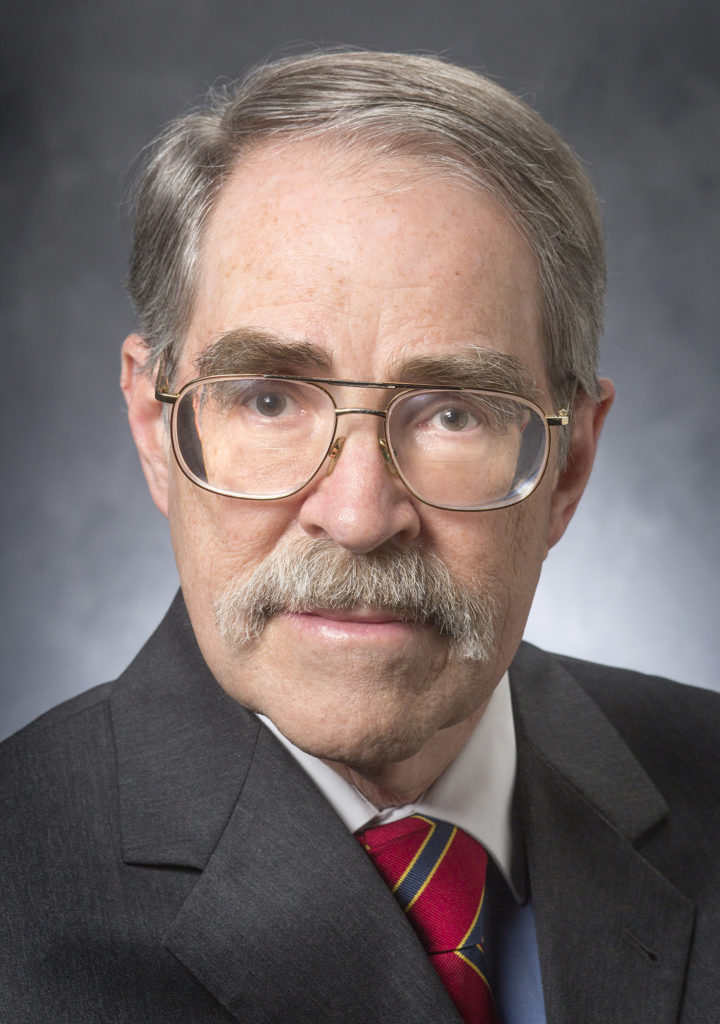Charles S. Bullock III, the Richard B. Russell Professor of Political Science in the School of Public and International Affairs, has been named University Professor, an honor bestowed on faculty who have had a significant impact on UGA beyond normal academic responsibilities.
Bullock, who is also a Josiah Meigs Distinguished Professor, joined the UGA faculty in 1968. During his more than four decades at the university, he has established himself as the state’s pre-eminent scholar on Southern politics.
“Dr. Bullock’s exemplary contributions to the teaching, research and service mission of the University of Georgia span decades and continents,” said Pamela Whitten, senior vice president for academic affairs and provost. “He is a leading scholar of Southern politics, and many of his students have gone on to serve their communities, state and nation with distinction. He is a respected, trusted source of information for domestic and international journalists, and he epitomizes the extraordinary impact that our faculty have on our state and world.”
Bullock has mentored hundreds of future leaders both in the classroom and as director of the Georgia Legislative Internship Program since 1977. Bullock’s former students at UGA have gone on to become “a virtual ‘who’s who’ of state and regional public figures,” colleagues say, and he has cultivated relationships with other leaders through his nonpartisan consultancy, including as a frequent speaker in the Carl Vinson Institute of Government’s Biennial Institute for Georgia Legislators and other programs.
“Few professors at the University of Georgia have had such wide-ranging and long-lasting influence on Georgia politics,” said Georgia House Speaker David Ralston in a nomination letter. “He has taught many of those who practice politics in the state of Georgia and beyond, as well as many of those who seek to influence politics and who report about it.”
In addition to his teaching and scholarship, which includes authoring, co-authoring or co-editing 30 books, 85 book chapters and 140 journal articles, Bullock has served as consultant to attorneys general in 11 states as well as to more than 70 local and state governments. He gives presentations and talks to organizations throughout the state and has become the “go-to” source for the media involving politics. He has been quoted in publications ranging from the Athens Banner-Herald and the Atlanta Journal-Constitution to national and international media such as the Wall Street Journal and Al-Jazeera. He was recognized as one of the 100 most influential Georgians in 2011 and 2012 by Georgia Trend magazine, and he was named to James Magazine‘s Most Influential List in 2012.
“He views media interviews as a logical extension of his roles as teacher and scholar,” said Thomas P. Lauth, former School of Public and International Affairs dean and professor emeritus. “His analysis of political events is informed by his research, and his commentaries extend his teaching to the larger community of the state and region.”
Bullock has received research grants from the National Science Foundation, the National Institute of Education, the Pew Charitable Trusts and the American Enterprise Institute. His work has been recognized with awards from the Southern Political Science Association, the Southwest Political Science Association and the Georgia Political Science Association, as well as the William A. Owens Creative Research Award, bestowed by UGA in 1991.
Bullock has served as Plumer Visiting Fellow for St. Anne’s College at Oxford University, Visiting Scholar for the Hoover Institution at Stanford University and twice as Senior Fellow for the Rothermere American Institute at Oxford University. In 2008, he was recognized for Outstanding Service to the state of Georgia in separate resolutions adopted by the Georgia House and Senate.
University Professors receive a permanent salary increase of $10,000 and a yearly academic support account of $5,000. The honor was first awarded in 1974, and no more than one University Professor can be named in any year.
